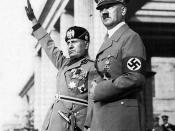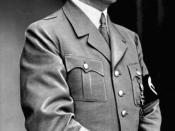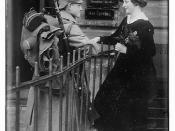Without the advent of the medium of film to wage a war of propaganda both the Axis and the Allies of World War II would have found it difficult to gather as much support for their causes as they did. Guns, tanks, and bombs were the principal weapons of World War II, but there were other, more subtle, forms of warfare as well. Words, posters, and films waged a constant battle for the hearts and minds of the masses of the world just as surely as military weapons engaged the enemy. Persuading the public became a wartime industry, almost as important as the manufacturing of bullets and planes. Both sides launched an aggressive propaganda campaign to galvanize public support, and some of these nation's foremost intellectuals, artists, and filmmakers became warriors on that front. Propaganda in the broadest sense is the technique of influencing human action by the manipulation of representations.
These representations may take the spoken, written, pictorial, or musical form. Since the cinema uses all four of these types of representations, a filmmaker would seem to wield a lot of power as a propagandist. If he so chooses to use his power to its fullest potential. The essential distinction lies in the intentions of the propagandist to persuade an audience to adopt the attitude or action he or she espouses. This is ever so prevalent as Hitler gained support from his nation to exterminate the Jewish people from Germany and Europe alike. He adopted such support by using his Nazi propaganda films as a weapon of mass distraction and manipulation of the people of Germany. If he had not idealized the German soldier as a hero, and bestowed nationalism in his people, and blamed the economic problems of German on the Jewish race then he never would have...



Comment
Good essay, but I think the formatting needs a lot of work because it's kind of hard to read as one humongous paragraph.
4 out of 4 people found this comment useful.